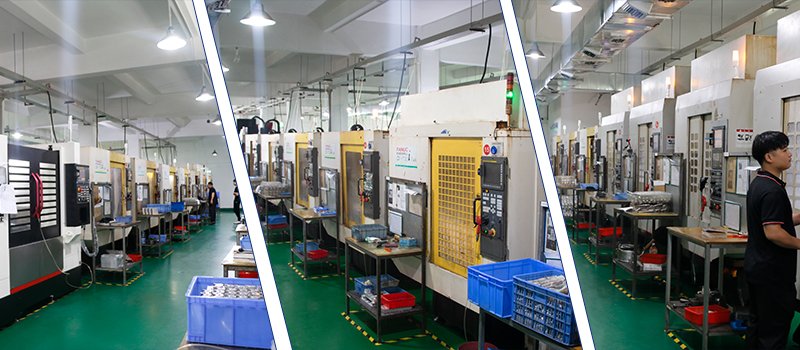When it comes to modern manufacturing, CNC machining stands as a versatile and efficient solution for producing parts with precision. But one of the most frequent questions I hear from clients is, “What materials can CNC machining work with?” As someone with years of hands-on experience in the industry, I’ve learned that the choice of material is as crucial as the machining process itself. In this guide, I’ll break down the most common materials suitable for CNC machining and explain why they’re ideal for different applications.
Why Material Selection Matters in CNC Machining
Choosing the right material for your CNC machining project can be the difference between success and failure. The material affects every aspect of the process, including machinability, cost, durability, and final performance. For instance:
- Need a lightweight yet strong component? Aluminum might be your best bet.
- Looking for extreme heat resistance? Titanium could be the answer.
- Want affordability and ease of machining? Plastics like ABS can deliver.
Let’s explore the primary categories of materials used in CNC machining.
Metals in CNC Machining
Metals are the most commonly used materials in CNC machining, thanks to their strength, durability, and versatility. Here are the top contenders:
- Aluminum
Aluminum is a superstar in CNC machining, and for good reason. It’s lightweight, corrosion-resistant, and offers excellent machinability. Common alloys like 6061 and 7075 are widely used in aerospace, automotive, and consumer electronics industries.- Applications: Aircraft components, automotive parts, electronic housings.
- Advantages: High strength-to-weight ratio, affordable, recyclable.
- Steel
Steel, especially stainless steel, is known for its strength, durability, and resistance to wear and corrosion. Variants like carbon steel and alloy steel cater to different needs.- Applications: Medical tools, industrial machinery, structural components.
- Advantages: Strong, heat-resistant, versatile.
- Titanium
For projects that demand extreme strength, lightweight properties, and corrosion resistance, titanium is unmatched. It’s commonly used in aerospace and medical industries but comes at a higher cost.- Applications: Aircraft frames, surgical implants, high-performance automotive parts.
- Advantages: High strength, biocompatible, heat-resistant.
- Brass
Brass is highly machinable and offers excellent electrical conductivity, making it ideal for precision components and electrical fittings.- Applications: Plumbing components, electrical connectors, musical instruments.
- Advantages: Low friction, aesthetically pleasing, cost-effective.
- Copper
Copper is prized for its thermal and electrical conductivity, making it essential for applications where heat transfer or electrical performance is critical.- Applications: Heat exchangers, electrical wiring, radiators.
- Advantages: Conductive, malleable, corrosion-resistant.
Plastics in CNC Machining
CNC machining isn’t just for metals—plastics also play a significant role. They’re lightweight, cost-effective, and perfect for a variety of applications.
- ABS (Acrylonitrile Butadiene Styrene)
ABS is a durable and lightweight plastic often used for prototypes and consumer products.- Applications: Automotive interiors, toys, prototypes.
- Advantages: Impact-resistant, cost-effective, easy to machine.
- Polycarbonate (PC)
Known for its toughness and optical clarity, polycarbonate is ideal for safety equipment and transparent components.- Applications: Safety goggles, machine guards, electronic displays.
- Advantages: Transparent, impact-resistant, UV-resistant.
- Nylon
Nylon is a strong and flexible plastic used in mechanical components. It offers excellent wear resistance and low friction.- Applications: Gears, bushings, bearings.
- Advantages: Durable, self-lubricating, heat-resistant.
- PTFE (Polytetrafluoroethylene)
Commonly known as Teflon, PTFE is highly resistant to heat and chemicals, making it ideal for demanding environments.- Applications: Seals, gaskets, non-stick coatings.
- Advantages: Low friction, chemically inert, high-temperature resistance.
- POM (Polyoxymethylene)
POM, or Delrin, is known for its stiffness and dimensional stability, making it perfect for precision parts.- Applications: Electrical insulators, automotive components, gears.
- Advantages: Strong, machinable, wear-resistant.
Composites in CNC Machining
For specialized applications, composite materials provide unique properties that metals and plastics cannot offer.
- Carbon Fiber Reinforced Polymers (CFRP)
CFRP is lightweight and incredibly strong, making it a favorite in aerospace and high-performance automotive industries.- Applications: Aircraft wings, sports equipment, luxury vehicles.
- Advantages: High strength-to-weight ratio, corrosion-resistant.
- Fiberglass
Fiberglass is affordable, lightweight, and corrosion-resistant, often used for structural and insulating purposes.- Applications: Boat hulls, circuit boards, panels.
- Advantages: Strong, non-conductive, weather-resistant.
Factors to Consider When Selecting a Material
When choosing the best material for your CNC machining project, keep these factors in mind:
- Machinability
Some materials, like aluminum, are easier to machine than harder metals like titanium or composites. - Cost
Budget constraints can influence material choice. For instance, plastics are generally cheaper than metals. - Mechanical Properties
Consider factors like strength, durability, and flexibility. Will the part need to withstand high stress or wear? - Application Requirements
Does the part need to be heat-resistant, biocompatible, or conductive? Match material properties to your needs. - Surface Finish
Some materials, like brass or aluminum, are easier to polish and finish than others, like composites.
Common Challenges in CNC Material Selection
Even with experience, material selection can pose challenges. Let me share some tips to navigate these:
- Balancing Cost and Performance
High-performance materials like titanium might exceed your budget. Work with a trusted CNC partner to find a viable alternative. - Material Availability
Not all materials are readily available in every region. Ensure your supplier can source the material in time. - Understanding Limitations
For example, plastics may deform under high heat, and metals like titanium may require specialized tooling.
Conclusion
CNC machining is versatile, and the material options are vast. By understanding the strengths and limitations of metals, plastics, and composites, you can make informed decisions for your project. If you’re still unsure, working with an experienced CNC provider like yl-machining ensures that you’ll get the right guidance, material selection, and high-quality results.
So, what’s your next CNC machining project? Let’s start the conversation and turn your vision into reality!






